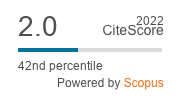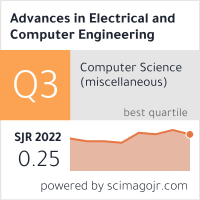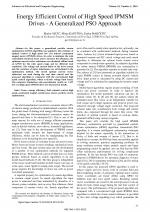| 1/2016 - 4 |
Energy Efficient Control of High Speed IPMSM Drives - A Generalized PSO ApproachGECIC, M. |
| View the paper record and citations in |
| Click to see author's profile in |
| Download PDF |
Author keywords
energy efficiency, field oriented control, high speed, permanent magnet synchronous motor, particle swarm optimization
References keywords
control(15), optimization(13), swarm(11), drives(11), electronics(10), pmsm(9), permanent(9), magnet(9), machines(9), iemdc(8)
Blue keywords are present in both the references section and the paper title.
About this article
Date of Publication: 2016-02-28
Volume 16, Issue 1, Year 2016, On page(s): 27 - 34
ISSN: 1582-7445, e-ISSN: 1844-7600
Digital Object Identifier: 10.4316/AECE.2016.01004
Web of Science Accession Number: 000376995400004
SCOPUS ID: 84960102896
Abstract
In this paper, a generalized particle swarm optimization (GPSO) algorithm was applied to the problems of optimal control of high speed low cost interior permanent magnet motor (IPMSM) drives. In order to minimize the total controllable electrical losses and to increase the efficiency, the optimum current vector references are calculated offline based on GPSO for the wide speed range and for different load conditions. The voltage and current limits of the drive system and the variation of stator inductances are all included in the optimization method. The stored optimal current vector references are used during the real time control and the proposed algorithm is compared with the conventional high speed control algorithm, which is mostly voltage limit based. The computer simulations and experimental results on 1 kW low cost high speed IPMSM drive are discussed in details. |
| References | | | Cited By |
Web of Science® Times Cited: 5 [View]
View record in Web of Science® [View]
View Related Records® [View]
Updated 2 days, 17 hours ago
SCOPUS® Times Cited: 6
View record in SCOPUS® [Free preview]
View citations in SCOPUS® [Free preview]
[1] Parameter Improved Particle Swarm Optimization Based Direct-Current Vector Control Strategy for Solar PV System, NAMMALVAR, P., RAMKUMAR, S., Advances in Electrical and Computer Engineering, ISSN 1582-7445, Issue 1, Volume 18, 2018.
Digital Object Identifier: 10.4316/AECE.2018.01013 [CrossRef] [Full text]
[2] Energy-Efficient Sensorless PMSM Pump Drive with mGWO and Loss Model for Field Orientation Control Strategy, Kalel, Dattatraya, Raja Singh, R., Iranian Journal of Science and Technology, Transactions of Electrical Engineering, ISSN 2228-6179, Issue 1, Volume 48, 2024.
Digital Object Identifier: 10.1007/s40998-023-00663-0 [CrossRef]
[3] Analysis of Steady-State Error in Torque Current Component Control of PMSM Drive, BRANDSTETTER, P., NEBORAK, I., KUCHAR, M., Advances in Electrical and Computer Engineering, ISSN 1582-7445, Issue 2, Volume 17, 2017.
Digital Object Identifier: 10.4316/AECE.2017.02006 [CrossRef] [Full text]
[4] Control of electrical generator used in sigma wave energy conversion system, Dumnic, Boris, Vukajlovic, Nikola, Vujkov, Barbara, Adzic, Evgenije, Popadic, Bane, Milicevic, Dragan, Katic, Vladimir, Corba, Zoltan, Jerkan, Dejan, Dragic, Mile, Hofman, Milan, 2017 International Symposium on Power Electronics (Ee), ISBN 978-1-5386-3502-5, 2017.
Digital Object Identifier: 10.1109/PEE.2017.8171712 [CrossRef]
[5] Advanced research and development facility for digital control of power electronic based drives, Vujkov, Barbara, Dumnic, Boris, Popadic, Bane, Milicevic, Dragan, Vukajlovic, Nikola, Katic, Vladimir, 2018 International Symposium on Industrial Electronics (INDEL), ISBN 978-1-5386-2353-4, 2018.
Digital Object Identifier: 10.1109/INDEL.2018.8637629 [CrossRef]
Disclaimer: All information displayed above was retrieved by using remote connections to respective databases. For the best user experience, we update all data by using background processes, and use caches in order to reduce the load on the servers we retrieve the information from. As we have no control on the availability of the database servers and sometimes the Internet connectivity may be affected, we do not guarantee the information is correct or complete. For the most accurate data, please always consult the database sites directly. Some external links require authentication or an institutional subscription.
Web of Science® is a registered trademark of Clarivate Analytics, Scopus® is a registered trademark of Elsevier B.V., other product names, company names, brand names, trademarks and logos are the property of their respective owners.
Faculty of Electrical Engineering and Computer Science
Stefan cel Mare University of Suceava, Romania
All rights reserved: Advances in Electrical and Computer Engineering is a registered trademark of the Stefan cel Mare University of Suceava. No part of this publication may be reproduced, stored in a retrieval system, photocopied, recorded or archived, without the written permission from the Editor. When authors submit their papers for publication, they agree that the copyright for their article be transferred to the Faculty of Electrical Engineering and Computer Science, Stefan cel Mare University of Suceava, Romania, if and only if the articles are accepted for publication. The copyright covers the exclusive rights to reproduce and distribute the article, including reprints and translations.
Permission for other use: The copyright owner's consent does not extend to copying for general distribution, for promotion, for creating new works, or for resale. Specific written permission must be obtained from the Editor for such copying. Direct linking to files hosted on this website is strictly prohibited.
Disclaimer: Whilst every effort is made by the publishers and editorial board to see that no inaccurate or misleading data, opinions or statements appear in this journal, they wish to make it clear that all information and opinions formulated in the articles, as well as linguistic accuracy, are the sole responsibility of the author.





